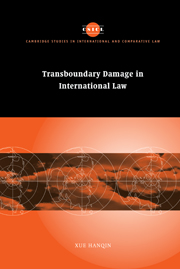Book contents
- Frontmatter
- Contents
- Foreward
- Preface and acknowledgments
- List of treaties
- List of cases
- List of abbreviations
- 1 Introduction
- Part I Accidental damage
- Part II Non-accidental damage
- Part III Damage to the global commons
- 6 Liability for damage to the global commons
- 7 Legal issues relating to damage to the global commons
- Part IV Underlying principles
- Bibliography
- Index
7 - Legal issues relating to damage to the global commons
Published online by Cambridge University Press: 22 July 2009
- Frontmatter
- Contents
- Foreward
- Preface and acknowledgments
- List of treaties
- List of cases
- List of abbreviations
- 1 Introduction
- Part I Accidental damage
- Part II Non-accidental damage
- Part III Damage to the global commons
- 6 Liability for damage to the global commons
- 7 Legal issues relating to damage to the global commons
- Part IV Underlying principles
- Bibliography
- Index
Summary
Damage to the global commons touches on a number of basic legal issues relating to remedies. Under international law, in order to make a valid claim for reparation for injury, two requirements must be met. First, the source State must have violated its international obligation towards the injured State. Secondly, on the assumption that each and every obligation of a State corresponds to a right of at least one other State, only that party to whom the international obligation is due is entitled to invoke the new legal relationship entailed by the internationally wrongful act of the source State under the rules of State responsibility. To invoke the responsibility of the source State for causing damage to the global commons per se, the law has to identify what international obligations the source State has violated under applicable international law. In this regard, the concept of erga omnes obligations raises a number of legal issues in the context of the protection of the world environment. Has such protection, for instance, constituted a normative obligation any derogation from which would give rise to a wrong under international law, or does it remain exhortative, calling for positive behavior from States in their use of world resources?
Supposing such a normative legal obligation does exist, the question remains as to who should be considered an injured State with the right to bring a claim against the source State under international law, or to act on behalf of the international community.
- Type
- Chapter
- Information
- Transboundary Damage in International Law , pp. 236 - 266Publisher: Cambridge University PressPrint publication year: 2003



